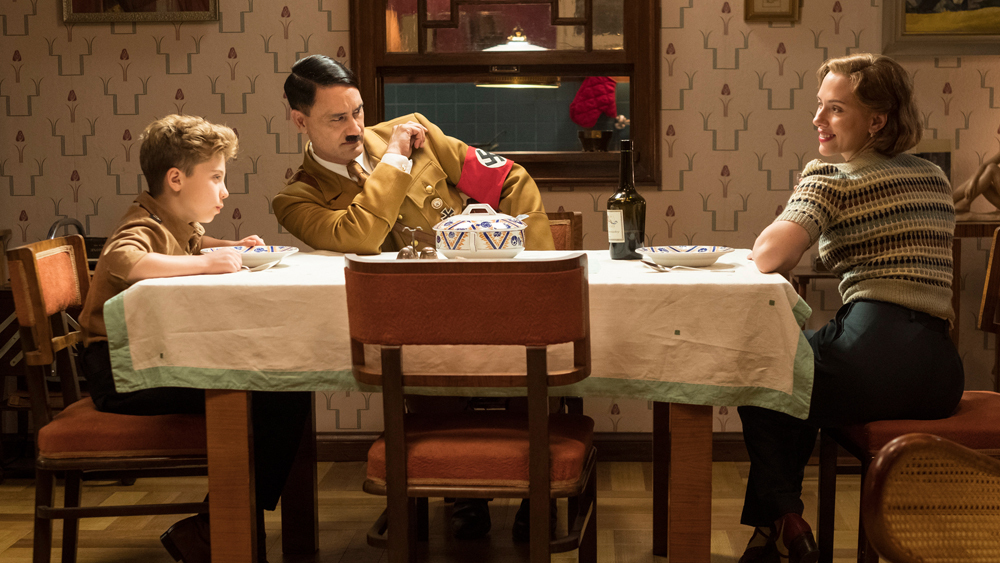
Before I begin, let me confess to you that no film genres turn me on the way satire and absurdist comedies do. If made well, these films emulate a certain audacity that serious cinema tackling the very same subject(s) do not. Produced in polarizing times where art forms get censored harshly through various prisms of righteousness, director Taika Waititi’s Jojo Rabbit is a brave feel-good comedy that criticizes the Nazi regime.
The intent is golden in Waititi’s film. The ingredients are even better. The leading man is a ten-year-old named Johannes alias Jojo (Roman Griffin Davis), a staunch supporter of Hitler’s policies. The young boy also forges an imaginary bond with the much-loathed dictator who makes fleeting appearances to assert the Nazi agenda. Jojo’s valour and zest to herald the Nazi flag are put to test in an early scene which exposes his sensitive self while also landing him a needless pet name – Jojo Rabbit. For the steadfast supporter that he is of Hitler, the little guy’s world comes crumbling when he discovers that his loving mother Rosie (Scarlett Johannson) has hidden a member of a deadly species – the Jews. The rest of Jojo Rabbit is about how Jojo figures out an unlikely equation with the 17-year old Elsa (Thomasin McKenzie).
If we pen down the core pillars of the story, Jojo Rabbit contains mostly simple messages. It is anti-racism, anti-hate, anti-war, pro-peace, and pro-equality. In order to tick some of these the checkboxes, the film carelessly takes up certain liberties which weren’t required in the first place. The tactic to lighten a destructive episode in history was not a questionable bait but the film’s temperament is unlike, say, Life is Beautiful. Waititi’s screenplay is sprinkled with oodles of humour and a lot of it is brought to us by Hitler himself (played by Waititi). The moral question arises whether it was a necessary plot to paint a vicious human being with a half-adorable tinge. Even if we exclude that layer of Hitler’s characterization, his is the least exciting track in the enterprise. The portrayal is zany and it might as well fascinate in individual scenes but, to me, his appearances functioned as pace breakers amid Jojo and Elsa’s budding friendship. Of course, the filmmaker’s intent to use Hitler as a device to mirror Jojo’s deeply indoctrinated value system might have been a clever ploy on papers but it does not quite translate.
Another troubling element in Jojo Rabbit is its adherence to offer an unnecessary perspective. Through Sam Rockwell’s Captain Klenzendorf, the film proclaims how there also existed good Nazis– an angle that nobody asked for. I mean, what is the point being made here? Who are we seeking empathy for? If at all Rockwell’s last scene was to be bound on his personal affection for the kid (Jojo), the film fails to establish the very equation between the two. Possibly, it’s a case of under-telling and maybe (to put it lightly), a little bit of exposition might have worked wonders here.
ALSO READ: ‘1917’ review – Sam Mendes’s war drama is a giant cinematic achievement
A couple of upsetting bits aside, Jojo Rabbit still remains a smashing film. I absolutely, absolutely dug the bond between the children –Jojo-Elsa, and Jojo-Yorki. The former, becoming the central crux of the film, is a delight with a bunch of clever lines being penned around some sincerely staged sequences. Be it Elsa’s hilarious description of Jews or the illustrated book called ‘Yoohoo Jew’, Jojo Rabbit often radiates the innocence of a quintessential children’s fare. Still, this isn’t a film that limits itself to its designated genre. There are dashes of horror, elements of romance and some time-tested drama decorating its core. On the contrary, Jojo and Yorki’s friendship is hilarious all through. The endearing Yorki’s appearance on the screen itself is a signal to a few minutes of a breather.
The mother-son portions are intense and lovingly intersected with the film’s comedic framework. The brief cycling trip to the park might look like a disconnected scene if we take the film in entirety but the dialogues, moments and frames that it offers are priceless – thus adding weight to Jojo Rabbit’s tragic undertones. It does not let us forget how the episodes are based in an era where fear loomed large. Collecting residues of the above track, the finale involving Elsa and a shoelace takes is sure to induce tears in an average viewer who is in to watch an emotional, feel-good fare – which Jojo Rabbit is in every sense of the word. Yes, the syrupiness in the last reel is not everyone’s cuppa tea but being a fan of the philosophy that ‘good things happen to good people’, I was sold right away.
While not intending to downplay Taika Waititi’s skills in any manner, I was particularly amused to see him employ several techniques from the poster boy of quirky, absurdist filmmaking – Wes Anderson. The symmetric frames, finite close-ups, rapid zooms, still frames of objects – each of which adds to making the film’s challenging subject come alive. Even the central character feels eerily similar to the young boy in Moonrise Kingdom. There arises the question of whether Anderson would have made it any better. Well, the rather seamless amalgam of genres that Waititi manages to pull off here is not quite Anderson’s forte is all I can say. Talking about influences, the pre-climax works nearly as a loving ode to Quentin Tarantino and, I must assert, how friggin’ well-done it is.
Actors are on top of their games, which helps Jojo Rabbit in a massive way. Roman Griffin Davis, who makes his debut, is an astonishing find and his body language and reflexes can easily put many a seasoned actor to shame. Matching him to a T is Thomasin McKenize who simply ups her standards from last year’s breakthrough act in Leave No Trace. Scarlett Johannson is spectacular in a fashion that is so characteristic of hers by now – fiery, strong and undebatable warm. Sam Rockwell glides through his simplistic character with ease whereas Waititi’s Hitler act is decidedly over-the-top. Last but not the least, no review is complete sans a mention of Archie Yates (who plays Yorki) and Rebel Wilson (a Nazi instructor) – the sensational (and plump) duo who steal the film’s best lines.
As the film concluded, I couldn’t resist noticing the contemporariness in the film’s politics. There is this powerful scene set in an attic where Johannson’s Rosie describes Elsa on what is to be a woman. A clear-cut example of great writing and powerful acting, the moment concludes with Elsa questioning how could a woman trust someone. To that question, Rosie assertively replies, “You trust them,” The underlying message here says a word or two on the state of women in modern times. Further, the film’s plot is also worth comparing notes with the existing political and racial skirmishes in the United States or, for that matter, even in a developing nation as India. The situation where an unassuming ten-year-old is conditioned to believe how a certain ideology is a way to be is not different from the oppressive communal forces carving minds in India to spread Islamophobia and combat the surge of minorities. That way, somewhere it felt so well-meaning of Waititi to make a film that brings forth an ocean of allegories which can be interpreted differently by viewers from diverse geographies. The unabashed, idiosyncratic characters and the dollops of humour are mere add-ons, I would say.
Rating: ★★★ 1/2
Jojo Rabbit is now streaming on Disney+ Hotstar.

